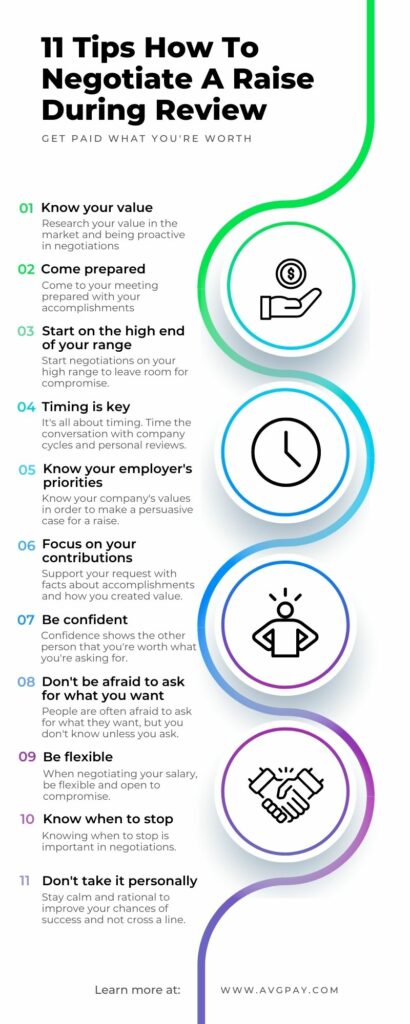If you’re planning to ask for a raise during your annual review, it’s important to be prepared. Negotiating a raise can be daunting, but with proper research and preparation, you can increase your chances of success. Here are some tips on how to negotiate a raise during your review.

1. Know your market value
Negotiations and discussing money can be tough, but if you have a clear understanding of your value and what you bring to the table, it will be easier to ask for what you deserve, especially when asking for a raise.
Start by researching your industry and finding the average salary for someone in your position and career. Then, take into account your own experience and skill set. Once you have a good idea of your worth, it’s time to start negotiating.
Be confident in your request, and be prepared to discuss why you should get a raise. If your employer cannot meet your demands, try asking for other benefits, such as more vacation days or flexible hours. By understanding your value and being proactive in negotiations, you can ensure that you are fairly compensated for your work.
2. Come prepared to your performance review
Once you know what you’re worth, you’ve got to make sure you come to the meeting prepared, so it’s time to start preparing for your negotiation. Make a list of why you deserve a raise, including data about your accomplishments, projects that were successfully completed and contributions to the company.
Research your company’s financial situation and budget if you know it, so you can make a case for why you deserve a raise based on the company’s profitability.
By coming to the meeting prepared, you will be better positioned to attend your annual review and discuss a raise that reflects your true worth.
3. Start high
When you’re ready to begin negotiations, it’s important to start high. This doesn’t mean that you should ask for an outrageous amount, but you should ask for more than you think you’ll get. This leaves room for compromise. If you start too low, you may settle for less than you’re worth. However, if you start at the high end of your range, you can talk down to a salary that is still fair and competitive.
Research salaries for similar positions in your area to get an idea of what the range should be. Then, when you’re ready to begin talking about a pay raise, start at the top of that range.
4. Timing is key
The timing of your request for a pay increase is also important. If you just started at the company, it’s probably not the best time to ask for a raise. Instead, wait until you’ve been with the company for at least six months to a year. This will give you time to prove your worth and show what you can do for the company.
The timing of when you start the salary negotiation in a performance review is also important. During the meeting, your boss will likely give you feedback on your performance.
Once you’ve received this feedback, it’s a good time to bring up the topic of a raise or a salary bump. You also have to read the room a little here. If it seems like they are happy and you’ve received positive feedback on your performance, it’s probably a good time to ask for a salary increase. But if it seems like they’re not too pleased with your performance, it might be best to hold off.
5. Know your employer’s priorities
Any good negotiation starts with knowing what your employer values most. Do they value loyalty? Years of service? Results? Once you know their values, you can make a case for why you deserve a raise.
For example, if your employer values results, you can point to ways you have helped the company achieve its goals. If the organization values years of service, you can highlight the institutional knowledge and valuable relationships you have built over time. Whatever their priorities may be, knowing them will help you make a persuasive case for why you deserve a raise.
6. Focus on your contributions
When it comes time to ask for a raise, it’s important to focus on your contributions. This could include increased sales, new clients, or cost savings. Whatever it is, make sure you have specific examples to support your request that will help justify it.
For example, if you’ve increased sales by 10% over the past year, mention that having hard data to back up your claim is always better. Or, if you’ve been able to save the company money by implementing new efficiencies, make sure to point out that as well. By focusing on your contributions, you’ll be in a much stronger position to argue for a raise. And who knows, you may just get what you’re asking for.
The easiest way to do this is to keep a running list of your accomplishments throughout the year. That way, when it comes time to ask for a raise, you’ll have a ready-made list of all the great things you’ve done for the company.
7. Be confident
Being confident is important in all aspects of life, especially when you’re negotiating. It’s important to remember that you’re worth what you’re asking for and not to let the other person lowball you. This is a give-and-take process, but if you don’t hold your ground, you’ll end up with less than you deserve. Being confident doesn’t mean being cocky or aggressive; it simply means knowing your worth and not selling yourself short if you feel like your current salary is less than it should be.
Of course, it’s important to stay calm and reasonable while negotiating, but if you go in with confidence, you’re more likely to get what you want.
8. Don’t be afraid to ask for what you want
If you don’t ask, you don’t get it. It’s as simple as that. Yet, when having a conversation to determine if we can get more money, many of us are afraid to ask for what we want. We worry that we’ll be seen as greedy or ungrateful and that our boss will be so offended that we’ll end up getting nothing at all.
Remember that your company would much rather give you a small raise than risk losing you to a competitor. So, next time you’re in your performance review, don’t hesitate to ask for what you want. You may be surprised at how willing your employer is to meet your ask for more money.
9. Be flexible
When negotiating your salary, it’s important to be flexible. While it’s important to have a starting point, you must be willing to compromise if the other person isn’t able to meet your demands. Try to find some middle ground that both parties can agree on. This way, you’re more likely to get the salary increase you’re asking for.
Remember, it’s important to be confident and assertive when negotiating your salary. However, being too rigid could result in you not getting the raise. Be flexible and open to compromise, and you’ll be more likely to come out of the negotiation with a positive result.
While it’s important to have a starting point, you must be flexible. If the other person isn’t willing to meet your demands, try to find some middle ground.
10. Know when to stop
It’s important to know when to stop. If you’re asking for too much, you may not get what you want. However, if you’re too modest, you may end up with less than you should get.
Salary negotiations are especially tricky, as there is a fine line between being confident and greedy. If you’re asking for too much, the other person may not be willing to negotiate.
However, if you’re not asking for enough, you may leave money on the table. The key is to find the middle ground and know when to stop. By being aware of your limits and being willing to compromise, you can ensure that you get the best possible deal in any negotiation.
11. Don’t take it personally
Asking for a raise can be a difficult conversation to have with your boss. You want to be confident and assertive, but it’s important not to take things personally.
Remember, both asking for a salary raise and performance reviews are just business, and there’s no need to get emotional about it. Instead, focus on the facts. Explain why you deserve a raise, and back it up with examples of your recent successes. If you can stay calm and rational, you’re more likely to get the outcome you’re hoping for.
If you want to get a raise during your next review, it is important that you know your worth. Use our research tools to find out how much you should be making and follow our tips to negotiate like a pro. With this information, you will be able to confidently ask for the salary increase you deserve.

